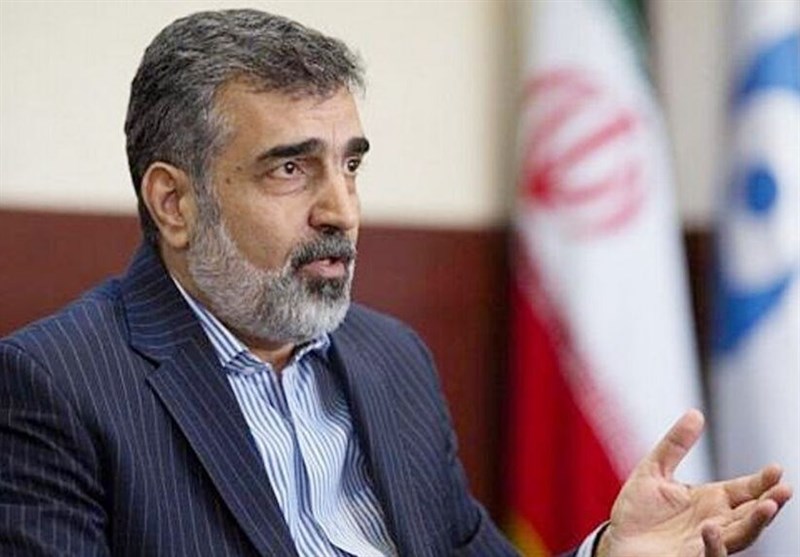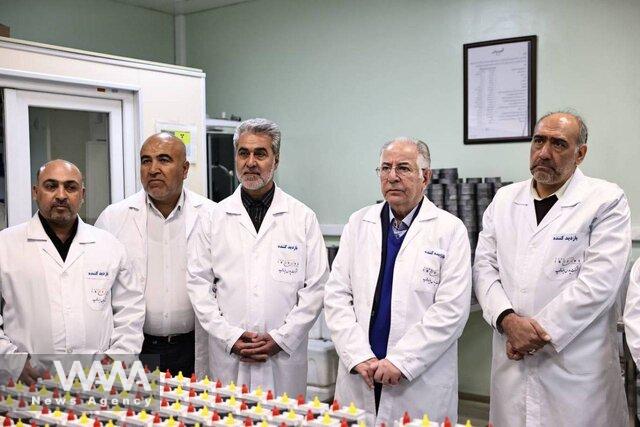Iran’s Nuclear Case Has Been Made Highly Complex and Political
WANA (Dec 04) – The spokesperson for Iran’s Atomic Energy Organization stated that the auditing of nuclear materials by the International Atomic Energy Agency (IAEA) in Iran is conducted with political motives and intentions.
Behrouz Kamalvandi, the spokesperson and Deputy for International Affairs, Legal, and Parliamentary Matters of Iran’s Atomic Energy Organization, during a meeting with university professors and scholars from various scientific centers across the country, remarked: “Despite the numerous actions and achievements in Iran’s nuclear industry, we are witnessing a widespread uproar from adversaries. This situation has caused our voice to be less heard globally.”
He added, “International relations revolve around the analysis of power dynamics, where the extent of a country’s power determines its position in the global hierarchy.”
Kamalvandi elaborated: “Power elements such as military, economic, and media strength are recognized globally. However, technology is a critical component of Iran’s power, contributing to other dimensions of strength. Technological advancements, including nuclear technology, significantly influence other fields. Globally, nuclear technology is considered a crucial element of power and contributes to the nation’s authority. By relying on science and expertise, we have succeeded in producing high-quality heavy water valued at $1,200 per liter and derivatives of deuterium, priced at thousands of dollars per milligram in international markets.”

Iran’s FM Warns of Nuclear Shift, Calls Geneva Talks a Crucial Brainstorming Session
WANA (Nov 28) – Speaking to the media during his visit to Portugal, Iranian Foreign Minister Abbas Araghchi described the upcoming meeting between Iranian and European negotiators in Geneva as a brainstorming session to explore possible ways out of the current impasse. “I am not optimistic about this meeting because I’m not sure we […]
He continued: “The pace of developments in Iran’s nuclear technology is remarkably high, and adversaries are actively trying to impede the progress of our industry and technology.”
Regarding the recent resolution passed against Iran by the IAEA’s Board of Governors, Kamalvandi noted, “Immediately after the resolution’s issuance, we initiated the activation of advanced centrifuge machines.”
He emphasized, “Unfortunately, adversaries have made Iran’s nuclear case highly complex and political.”
The spokesperson stressed the importance of raising public awareness about the role of nuclear technology in people’s lives, saying, “Nuclear technology and its achievements impact all aspects of public life. If we aim to excel in economics, technology, and power-building, special attention must be paid to the nuclear industry. On the global stage, strength is imperative because a country’s rights are granted in proportion to its power.”
He further added, “Iran’s geostrategic position is unique, and global powers seek dominance over this region for various reasons.”

Iran’s Atomic Energy Organization’s spokesperson : Western Pressure Fuels Iran’s Nuclear Expansion
WANA (Nov 23) – Behrouz Kamalvandi, spokesperson and deputy for international affairs at Iran’s Atomic Energy Organization, responded to Western actions at the IAEA Board of Governors meeting, stating that such pressures are ineffective and will only lead to an increase in Iran’s enrichment capacity. He remarked, “Every time a resolution is issued, fewer countries […]
Kamalvandi stated, “Western sanctions and pressures pushed us toward self-sufficiency in the nuclear industry. In past years, essential tools and equipment for this sector were either denied to us or sold at exorbitant prices. Despite these challenges, adversaries have consistently tried to tarnish our image, claiming that Iran pursues nuclear weapons.”
He reiterated, “Based on the Supreme Leader’s fatwa and the consensus of religious authorities, Iran is not seeking nuclear weapons. Yet, they continue to create controversies, even over minor issues such as alleged sites, leveraging these claims for political objectives. While the IAEA’s duty includes nuclear material auditing, in Iran’s case, this is pursued with political motives. Evidence suggests that certain nations aim to weaken Iran politically, both domestically and internationally, and create rifts between the government and its people. To this end, they have taken numerous actions.”
He concluded, “Nuclear science, as an interdisciplinary field, warrants dedication and effort because it plays a pivotal role in addressing various industrial needs.”
Highlighting the organization’s achievements in producing radiopharmaceuticals, Kamalvandi said, “Every type of radiopharmaceutical produced globally is now manufactured domestically at high quality. For some of these drugs, we rank among the top producers worldwide.
Achievements in nuclear technology have the potential to energize Iran’s economy by reducing dependency and enhancing national power.”

He stressed the need to familiarize students and the general public with nuclear science and technology. “The benefits of nuclear technology, such as nuclear power, must be communicated to all Iranians. Over the past year, the electricity generated by the Bushehr Nuclear Power Plant saved the consumption of at least 13 million barrels of crude oil, equivalent to around $900 million, and prevented the emission of approximately 7 million tons of environmental pollutants annually.”
He added, “High school and technical school students must be introduced to the advantages of this technology. Efforts in this area have begun and are being expanded. Additionally, significant media initiatives are underway to familiarize the public with Iran’s nuclear achievements.”
During the meeting, university professors emphasized the need for collaboration between the scientific community and Iran’s Atomic Energy Organization.
The event concluded with a visit by the professors to the Shahid Fakhrizadeh Research Reactor and laboratories producing radiopharmaceuticals and radiation systems in Tehran.












